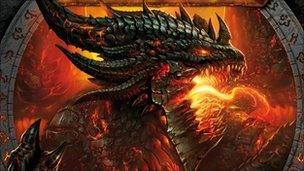Gaming and raiding in World of Warcraft
- Published
Paragon, the guild with the world's best players of WoW, mounts a raid to slay Nefarian and Onyxia in an epic battle against the two dragons.
Your challenge, if you choose to accept it, is to gather 25 strangers from around the world and organise them into a fighting force capable of defeating the strongest foes.
You must be intimately acquainted with their strengths and weaknesses and deploy them wisely to make the best of those talents.
Even so, with all this planning and co-ordination your chances of success are slim. The odds pitted against you are enormous. A single mistake could spell your doom.
This is not a recruiting pitch for a shady branch of the armed forces, but it is the task facing anyone contemplating becoming one of the best raiding groups in World of Warcraft (WoW).
The culture of those top raiding groups or guilds is being studied by Ladan Cockshut, a PhD student at the University of Durham.
Her work interviewing the raiders and playing alongside them has convinced her that, at the top level, raiding is more like an extreme sport than ordinary gaming.

The Cataclysm expansion for World of Warcraft introduced a lot of new raiding content
Top level raiding, she said, has as much in common with the average experience of WoW as a bike ride in the park has with the Tour de France.
Tough fight
Raiding takes place in what are known as instances - separate sections of the WoW game world that are the dwelling places of very powerful creatures. To complete an instance, a raid team has to fight through the minions and acolytes and then confront the boss in a final, epic battle.
The reason it is so tough, she said, is because everything in those instances is stacked against the players. The minions, acolytes and boss have their abilities boosted so they are even harder to kill than ordinary creatures. Players can also choose to run the instance at different settings to make it even harder.
"There's a very high possibility of failure and very low chance of success," Ms Cockshut told the BBC's Outriders programme. "The room for error is very small. You really have to be careful what you do."
It is not simply a matter of turning up, swinging a sword or casting a spell. Instead, she said, the teams of people that take on the biggest, baddest foes in WoW have to work together like a well-oiled machine.
The strongest warriors typically engage the boss and need constant healing to ensure they stay alive. Other characters hang back and cast spells that support the leading warriors and gradually deplete the health or thwart the spells or other abilities of the boss.
"Raids can go on for a long time," said Ms Cockshut. "They are very complex encounters especially when groups are learning how to defeat a boss for the very first time.
"I've had experiences where it's taken at least 40-50 hours of gameplay time to complete a raid," she said.
That raid time is typically spread over several days a week for 3-4 weeks as a guild learns how to take down a boss.
"If the boss is able to kill you as a group before you are able to kill him you re-set the fight, so everyone goes back in, goes up to the big boss and starts all over again," she said.
"You end up repeating the same encounter over and over and over again until you accomplish it," she added. "That 40 hours could represent 100 - 300 attempts at the same boss."
Dynamic range
So, why do they do it? If the chances of success are so slim and the margins of error so small, why bother.
One reason is because the monsters in a raid instance typically drop loot, powerful artefacts and weapons, that cannot be found anywhere else. For people who want their characters to become more powerful that is a strong draw.
But there are other reasons too. Pekka Aaltonen, spokesman for top guild Paragon that Ms Cockshut is studying, said raiding at the highest level transcended WoW.
"I'm having fun playing a game with friends, many of whom I also know now in real life," he said.
"I'm competing at the cutting edge, aiming for perfection," he said. "World of Warcraft is the medium for that, and competition in this game is an intriguing combination of strategy and tactics management (effectively a logic puzzle), executing your part perfectly (like a typical game), and teamwork."
Ms Cockshut's research backs up this assertion that the challenge of high level raids is what motivates people as much as the social aspect of playing with people who become firm friends.
The relevance of raiding transcends WoW in another way too, said Ms Cockshut. The virtual teams and teamwork it demands are likely to be in demand as the world makes more use of the web.
"There is a lot for us to learn about how people co-ordinate this," she said. "What they are doing has a lot of implications for group dynamics, management and other approaches in business that we really need to start taking seriously."
- Published15 December 2010
- Published14 December 2010
- Published7 December 2010